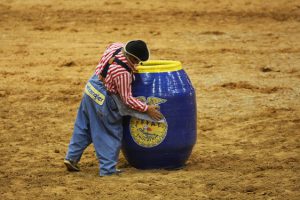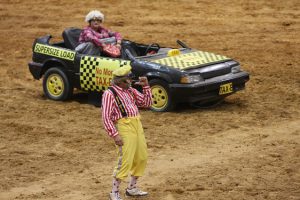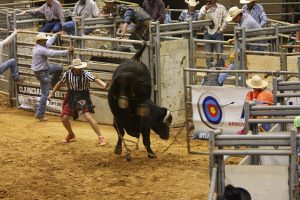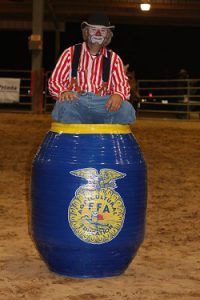
By Gayle Fortenberry & Jessica Smith
Connections Magazine
Perseverance. The continued effort to do or achieve something despite difficulties, failure, or opposition; steadfastness in doing something despite difficulty or delay in achieving success.
According to Ronald Burton, a professional rodeo clown and entertainer from Philadelphia, MS, perseverance is also what it takes to stay focused on the job when a 1,500-pound animal is running straight for him in a rodeo arena week after week, and it’s been key to finding and establishing a career that he loves.

Burton’s career journey began at Neshoba Central High School in Philadelphia. After he was knocked unconscious from a hit in football practice, Burton decided that football might not be the right path for him. His friends talked him into taking agriculture classes with them and joining the FFA.
During the summer following high school graduation, Burton was selected as the state reporter for the Mississippi FFA Association. He had the opportunity to sharpen his leadership skills, travel across the state meeting other FFA members, and promote agriculture and the FFA. At that time, he thought he wanted to become an agriculture teacher, but life took him in an entirely different direction.

“When I was in high school, my passion for rodeo found me,” said Burton.
His friends from agriculture class talked him into going to a local rodeo venue, Lovern’s Arena, and taking a chance at riding a bull just for fun. That first ride hooked him. He became an amateur bull rider for about four years; then he entered the professional bull-riding rodeo circuit.
“After two years of being a professional bull rider, I learned that I was no good at riding bulls, and I wasn’t getting any better,” said Burton. “So I quit and became a bullfighter and rodeo clown at high school rodeos.”
Bullfighters are rodeo athletes whose job it is to protect the cowboys when they hit the ground after riding the powerful bucking bulls. The bullfighter serves as a distractor to the bull, giving the cowboy a chance to get back up on his feet and out of the arena to safety.
“Bullfighting is a reaction sport; you have to anticipate where the bull is going to go next,” said Burton. “The job is very dangerous but also very important.”
Burton says the first time he was in the arena as a bullfighter he knew he was in the right place. He learned quickly that he had to earn the cowboys’ trust to protect them. His leadership skills kicked into high gear as he built relationships and practiced staying calm in situations where his and other people’s lives were at stake. He had to put perseverance into action each time he worked an arena because he would eventually get knocked down by a 1500-pound bull. With others’ safety depending on him, finding the courage and strength to get back up again was important.
Bullfighters typically wear bright, loose-fitting clothing with protective gear underneath and clown makeup to attract the attention of the animal. In many professional rodeos, there are two bullfighters on foot protecting the riders, and a third person works as the rodeo clown in the barrel. The barrel man is also a bullfighter but uses the metal barrel to jump into for protection and to serve as a target to distract the bull. This person’s job is also to entertain the audience with antics, jokes, and comedy routines.

Work as purchasing agent and inside sales representative only left time for bullfighting on the weekends, but the rodeo life still pulled at him. Nearly 14 years after high school graduation, Burton moved to Texas with the goal of becoming a professional bullfighter.
During that first year in the heart of the rodeo world, no one would hire him. There were hundreds of other bullfighters vying for positions on the Texas rodeo circuit, in which you could find a rodeo to work every day of the week. Not understanding the business side of rodeo was tough, and he had to find a way to rise to the top.
Eventually, his personality, sense of humor, leadership skills and work ethic propelled him to do things the right way in the rodeo business, and he began to earn bullfighting and rodeo clown contracts. Perseverance paid off, and three years after moving to Texas, Burton was selected by the bull riders in the Tri-State Rodeo Circuit to be the rodeo clown for their prestigious Finals rodeo. Just before that event, however, Burton tore the Achilles tendon in his foot and was sidelined with a leg cast for six months. The rodeo committee at the Tri-State Finals valued his work so much, that they asked Burton to be the rodeo clown entertainer for the event despite the cast on his leg. At that point, his career began to really take shape.
Burton credits his high school agriculture program for the skills he uses to keep his work as a rodeo entertainer operational and successful. Agriculture teachers Charles Hand and Rusty Suttle taught him skills, such as welding, fabrication, mechanics, and a knowledge of basic electricity, that help him as he designs and maintains the props for his clown acts. The men also imparted to Burton an understanding of agribusiness management and the value of hard work. They pushed him to develop public speaking abilities and strong leadership qualities through involvement in FFA competitions and activities. These skills are used every time he negotiates entertainment contract terms and communicates with rodeo contractors and event committees regarding the quality of work they are to expect from him.

“Rusty Suttle was always telling us to sit down and be quiet,” said Burton. “He also consistently advised us to keep our head on straight and to stay calm in tough situations.”
Little did Burton know how valuable these words would be each time he goes to work, where his job is to protect the lives of cowboys in the rodeo arena.
Burton estimates that he is on the road traveling to rodeos 250-270 days out of the year, covering 60,000-70,000 miles. He acts as his own business manager, contract negotiator, scheduler, show manager, animal caretaker, equipment mechanic, and public relations specialist. He has earned the prestigious Professional Rodeo Cowboy Association membership card, which declares him a professional Barrel Man, Specialty Act, and Music Director and authorizes him to work any professional rodeo anywhere in the world. Since 1996, he has won numerous championship awards as a Bullfighter, Barrel Man, and Rodeo Clown. He has also been named the Texas Cowboys Professional Rodeo Association Contract Act of the Year for six years in a row. In addition, Burton is the subject of an award-winning documentary entitled Man in the Can, produced by filmmaker Noessa Higa.
When asked what advice he would give CTE students regarding planning for their future career, Burton advised that students should never stop setting goals for themselves.
“When you find something you are passionate about, go for it. Don’t give up when things get in the way of your goals. Persevere.” said Burton.
Burton’s rodeo schedule and other information can be found online at ronaldburton.net.
For more information about the Man in the Can documentary, visit maninthecanmovie.com. Follow Burton on Facebook at facebook.com/ronaldburtonrodeoclown.
